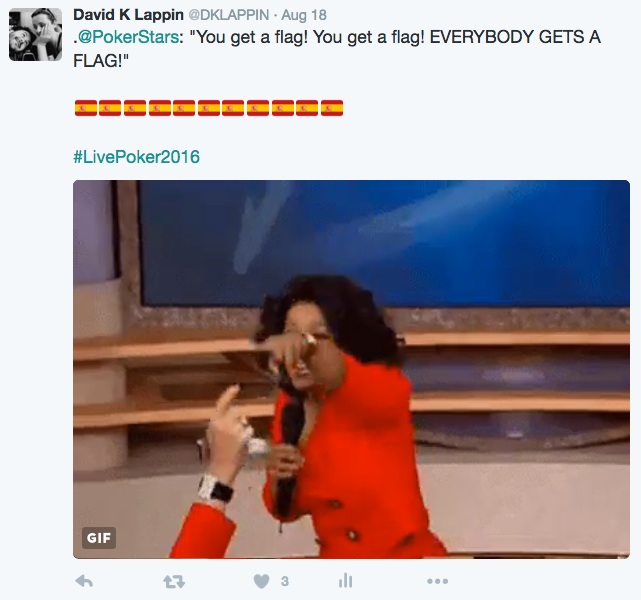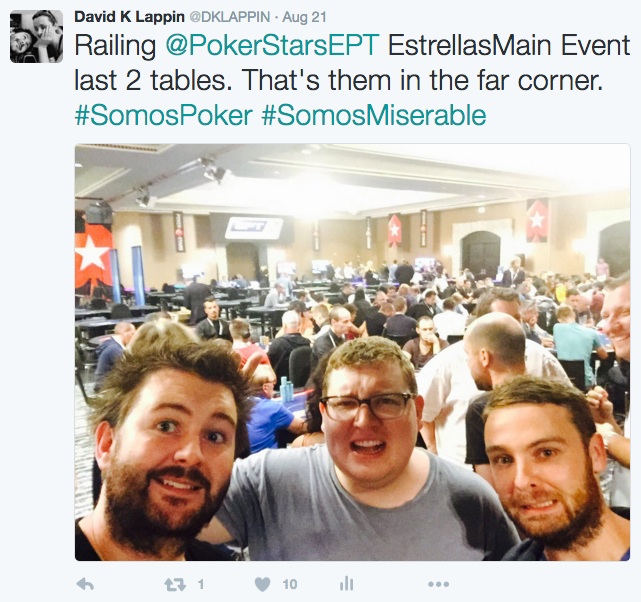#241: “Corn-Cockles And Weeds”
Some time over the Summer, Pokerstars put up the schedule for EPT Barcelona. The structures of most side events were worse than last year with shorter levels and the introduction of a very aggressive ante. There would be ungodly 10am start times. There were also very few sub-€500 tournaments. On August 17th, Pokerstars announced that they were paying out 20% of fields at EPT/Estrellas Barcelona. On August 18th, I penned the following tweet, virtually ensuring that I would go the whole festival without troubling the scorers:
On August 18th, it was announced that the bottom quarter of that 20% would receive €1100. That’s right – the buy-in back. Not a penny profit. Not even the price of a coffee. A veritable ‘refund of shame!’. Even the 80s quiz show Bullseye used to give the losing finalist ‘BFH’ (bus fare home), admittedly after host Jim Bowen told the 50 year old house-wife from Birmingham that she could have won a speedboat. Pros and recreational players alike immediately spoke out. Pros fancy themselves to finish in the top spots more often so any amount of shaving those prizes in favor of 5% of the field getting a rebate hurts their longterm ROIs. Ten minutes after several of them took to twitter to voice their concerns, Pokerstars announced that 23% of the Highroller would be paid out – a real ‘back-in-your-box’ power move. Recreational players said that the number one draw for them is the long-shot opportunity of the biggest score possible and that they loathed the idea of a cash not covering any expenses.
On August 21st, Nick Newport and Dan Wilson were down to the final 12 of the almost 3500 runner Estrellas Main Event field. Needless to say, I wanted to rail what could be a life-changing score for two close friends but was thwarted in this end by an over-eager bouncer who thought he was emptying out Opium at 6.30am. He was rude, physical and hostile towards all the railbirds, eventually confining us to a roped off ‘pig pen’ 60 meters away from the table. Only for the intervention of soon-to-depart the tour TD extraordinaire and Mr. Common Sense Nick O’Hara, we wouldn’t have been able to cheer on our friends who both make the final table where they finished 4th (Nick) and 9th (Dan). Daragh Davey, Parker Talbot and myself tried to make the best of it but it really felt like Pokerstars were sucking all the fun out of the game.
At this point, I would like to say that while poker might be contracting, it is certainly not dying. A few months ago, SCOOP set new records for an online festival and Barcelona has just broke all records for a European festival. I would also like to say that there is nothing inherently wrong with making changes, tweaking formats or experimenting with structures. In fact, most changes, tweaks and experiments in poker have improved the game and resulted in a varied and diverse poker landscape.
What if we lock people into a poker game with increasing blinds until only one remains? The tournament was born. What if a tournament has a set number of players and starts when all those players are ready? The Sit N Go was born. What if we shorten the levels? Turbos were born. What if we reward knocking players out? Bounties were born. What if we allow cash game players to lower their variance in big all-In pots? Running it twice was born. What if we put the same players into 4 Sit N Gos, run them concurrently, create a points system for finishing spots, pay out a fifth of the prizepool to the top 3 finishers in each Sit N Go and pay the remaining fifth to the players who accumulate the most points. The Matrix was born.Okay, that last one is a bad example and those yolks were never going to catch on but you get my point: Change is not necessarily bad. However, bad changes are bad and not communicating those changes to your customers ahead of time is very bad. Worse again is wrangling up your pros for a piece of Pokernews propaganda that Joseph Goebbels himself would have thought was a bit much:
Pokerstars built a successful online brand because they created great software and a great user-interface. Be under no illusions – they became the market-leader because they (along with Full Tilt) flouted the UIGEA while the then industry-leader Partypoker and others obeyed the law. But they also hired smart people, marketed themselves cleverly and made some shrewd acquisitions. Sure, access to the US market place (40% of all online poker at the time) for the two and a half years between the UIGEA’s passing and Black Friday gave Pokerstars a huge edge over its competitors (a calculated gamble which paid off for the company but perhaps not for its former owner Isai Scheinberg who probably struggles to spend his half a billion quid trapped on the Isle of Man) but above all, they understood the value of good customer support.
Pokerstars built a successful live brand because they created a synergy between the live and online experience. Online satellites qualified players into live events. Live events lead to sign-ups for the online site. They hired great events managers and great tournament staff. Tours were essentially promotional vehicles, giving visibility to the brand so it was fine for them to run on a break-even model. Again, they made shrewd acquisitions and partnered well with local operators. Over all, players were treated like valued customers and, as a consequence, they felt valued and were loyal.
I am still nostalgic for that time and maybe I need to just snap out of it and accept the new reality but the truth is a large part of me genuinely believes it doesn’t have to be this way. I know for a fact that there are several Pokerstars staff working their arses off to deliver the best possible experience both online and live. I know they still value customer satisfaction. I also know for a fact that many of them hate the changes they are having to impose on the game because they now work for a publicly traded company who are making decisions to maximize profit in the short-term, regardless of the longterm impact.
The players might be reaping the refunds of shame now but if they are not careful, it is Amaya and its shareholders who will ultimately reap the corn-cockles and weeds.


